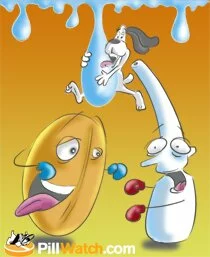
The pharmaceutical industry offers nowadays a wide variety of different medications to treat the symptoms of seasonal allergic rhinitis or, as we usually call it, hay fever. However, the mainstream of the treatment options is formed by only two classes of medications – nasal corticosteroids and antihistamines. These are the so-called “first line” treatments for hay fever.
Since hay fever is a very common disorder, many people visit pharmacies in search of some remedy against the stuffy and runny nose, irritation, swelling and itching in the nose, eyes or throat, caused by allergic rhinitis. Of course, it would not be out of place to visit a doctor before choosing a medication; however, the reality is that we often choose self-treatment, based on the TV ads or friends experience, rather than a professional medical treatment, especially when it goes about some minor disorders.
The information below should not be treated as the propaganda of self-treatment. It is rather an effort to supply those, who are in search of hay fever treatments, with some key data about corticosteroids and antihistamines, and to reveal some of the benefits and drawbacks of both classes of medications.
The representatives of antihistamines, commonly used in the treatment of hay fever, are Benadryl, Tavist, Claritin, Allegra, Zyrtec, Astelin.
The mode of action of antihistamines is based on their ability to block histamine – a chemical, which is released in the human body in response to some allergen. Once histamine is released, common signs of allergic reaction occur, such as tissues swelling, irritation, itching, etc.
Obvious benefit of antihistamines is their ability to treat many of the allergic rhinitis symptoms, such as swelling in the nose, itching in the eyes and throat. However, antihistamines are not very helpful with blocked or stuffed nose; that is why many of the newer antihistamines are supplied in combination with decongestant – a medication which helps to unblock nasal passages. You can easily define such combination drugs with the letter “D” that is usually present in the name of the drug (Claritin-D, Allegra-D).
From the point of view of effectiveness, different representatives of the antihistamine class are practically similar. For example, older medications as Benadryl and Tavist are as effective as new Claritin or Allegra. However, older antihistamines can make you drowsy and sleepy, which is considered to be the most serious drawback of antihistamines. New antihistamines, such as Claritin, Allergra or Zyrtec, do not cause drowsiness or sleepiness, however they cost much more than older antihistamines.
In general, antihistamines are known as very safe medications. Definitely, it is a big advantage of antihistamines, which differs them favorably from their competitors – corticosteroids.
Resume: antihistamines can be used for self-treatment of mild and infrequent hay fever (there are many OTC antihistamines available today). Older antihistamines can work effectively and can save you some money, but if you are going to drive a car or work with some machinery while taking antihistamines – it is better to choose newer drugs, which will not make you sleepy and drowsy.
Nasal corticosteroids
The representatives of this class of medications are Flonase, Beconase, Veramyst, Nasonex, Nasacort. Unlike antihistamines, which come in the form of oral tablets, most of the corticosteroids against allergic rhinitis are produced in the form of nasal sprays.
Corticosteroids help to improve the allergic symptoms, such as sneezing, itching in the nose, runny or stuffed nose. These medications work by decreasing the amount of histamine and prostaglandins. So, the mode of action is somewhere close to that of antihistamines. However, the difference is that corticosteroids work locally, namely in the nose without being absorbed in the blood stream.
The effectiveness of nasal corticosteroids makes them the first option in the treatment of hay fever. Many clinical studies proved nasal corticosteroids to be of higher potency than antihistamines in relieving the symptoms of hay fever.
On the other hand, in order to achieve the maximum results, nasal corticosteroids should be taken for up to 2 weeks. Unlike antihistamines, which may provide relief within minutes, corticosteroids work slower, but more effectively.
Another issue to underline concerning corticosteroids – clinical studies showed that these medications work best for nasal symptoms of hay fever, but may be of little help in treating itching in the eyes or throat.

Perhaps, the most disputable issue concerning corticosteroids is the safety of this class of medications. However, it should be noted that nasal corticosteroids are safe medications when used strictly according to the instructions. Nasal irritation (burning, stinging, dryness) and bleeding belong to the most common side effects of corticosteroids.
Finally, treatment with nasal corticosteroids is considered to be more cost effective in comparison to oral antihistamines.
Resume: nasal corticosteroids should be considered as the treatment options for those, who decided to use a powerful weapon against hay fever. Thanks to their high potency, nasal corticosteroids are the first-line option against moderate-severe allergic rhinitis. However, all the corticosteroids are available only by prescription, so it is not a good idea to use them for self-treatment.
| Tip for you : Sign-in with Your OpenID and post faster, easier and with easy access to all your past posts. | |
|
Your Nick: |
















